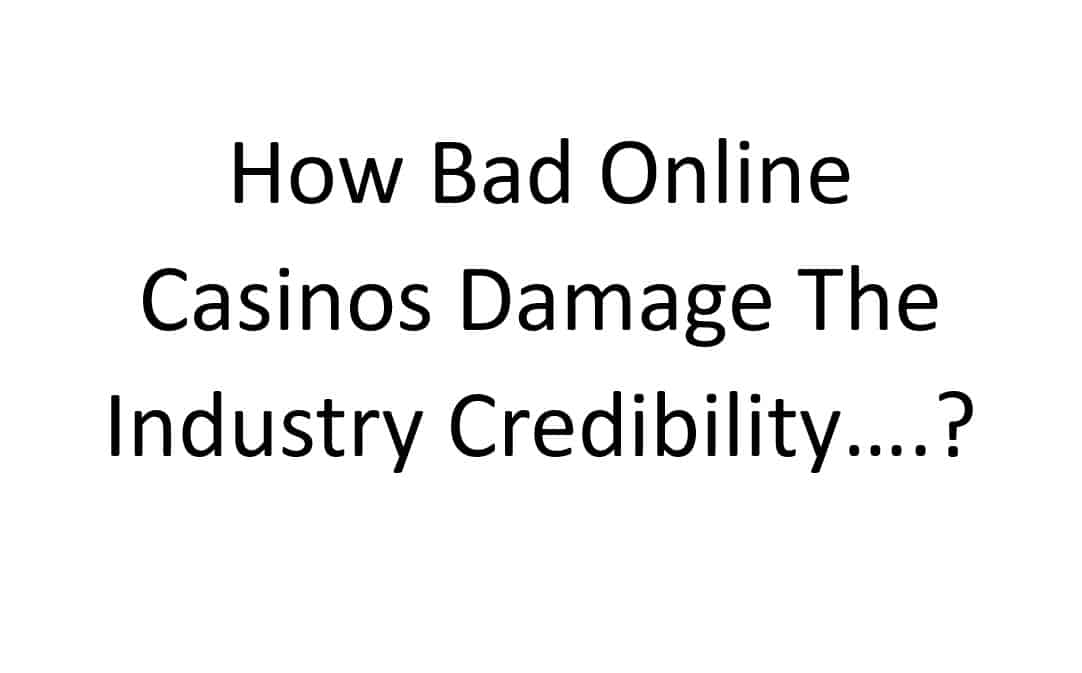
How Bad Online Casinos Damage The Industry's Credibility and How to Fight Back?
Online casinos have gained immense popularity in recent years, providing a convenient and thrilling gambling experience to players worldwide. However, as the industry expands, the issue of bad online casinos and their detrimental effects on credibility becomes increasingly significant. In this article, we will explore the negative impact of these unscrupulous establishments, how they tarnish the reputation of legitimate online casinos, and the strategies that can be implemented to combat this problem.
The negative impact of bad online casinos
Bad online casinos pose numerous challenges that can damage the industry’s credibility. One of the primary concerns is the lack of transparency and unfair practices. These rogue operators often manipulate game outcomes, withhold winnings, or impose unreasonable terms and conditions on players. Such dishonest behavior not only undermines the trust of individual players but also erodes the reputation of the industry as a whole.
Financial losses and scams are another consequence of bad online casinos. Players who fall victim to these scams may suffer significant monetary losses, causing them to lose faith in the entire gambling ecosystem. Such incidents contribute to a negative perception of the industry, deterring potential players and stifling its growth.
Damage to the reputation of legitimate online casinos
The presence of bad online casinos makes it challenging for legitimate operators to build trust with players. Many players associate the entire industry with the dishonest practices they have encountered, making it difficult for reputable casinos to differentiate themselves. As a result, customer retention rates may decrease, impacting the revenue and overall growth of legitimate online casinos.
Steps to fight back against bad online casinos
To address the issue of bad online casinos, multiple approaches can be taken. Government regulations and licensing play a crucial role in ensuring the integrity and credibility of the industry. By implementing strict guidelines and regular audits, regulatory bodies can weed out illegitimate operators and protect the interests of players.
Industry self-regulation and standards are equally vital in combating bad online casinos. Collaborative efforts among legitimate operators can establish best practices, codes of conduct, and self-regulatory frameworks. This not only provides a united front against dishonest operators but also instills confidence in players.
Player education and awareness are essential components of the fight against bad online casinos. By educating players about the risks, warning signs, and precautionary measures, they can make informed decisions and avoid falling into the traps of fraudulent online casinos. Online platforms can provide resources and information on responsible gambling, identifying licensed operators, and recognizing red flags of illegitimate establishments.
Furthermore, collaboration between legitimate online casinos and regulatory bodies is crucial in combating bad actors. By sharing information, industry stakeholders can identify and eliminate fraudulent operators more effectively. Establishing industry-wide standards and guidelines ensures that all casinos operate ethically, protecting the credibility of the industry as a whole.
The role of technology in combating bad online casinos cannot be overlooked. Advanced security measures, such as encryption protocols and secure payment gateways, safeguard players’ personal and financial information. Fraud detection systems analyze patterns and behaviors to identify and prevent fraudulent activities, providing an additional layer of protection.
Moreover, responsible gambling tools play a vital role in fighting back against bad online casinos. Legitimate operators offer features that allow players to set deposit limits, self-exclusion periods, and reality checks to promote responsible gambling practices. These tools help players maintain control over their gambling activities and minimize the risk of falling into the traps of dishonest operators.
Building trust through transparency and fair practices is paramount for the industry’s credibility. Legitimate online casinos prioritize clear and concise terms and conditions, ensuring that players understand the rules and requirements. Regular auditing and certification by reputable third-party organizations provide an additional layer of assurance, demonstrating a commitment to fair play and transparency.
Customer reviews and feedback are invaluable in establishing trust and credibility. User-generated content, such as reviews and testimonials, influences potential players’ decisions. Encouraging honest feedback and reviews from customers allows online casinos to address concerns, improve services, and demonstrate their commitment to providing a positive gambling experience.
In conclusion, the presence of bad online casinos poses a significant threat to the credibility and reputation of the industry. Their unfair practices, financial scams, and lack of transparency undermine trust and deter potential players. However, by implementing strategies such as government regulations, industry self-regulation, player education, and technological advancements, the industry can fight back against these bad actors. Collaboration between industry stakeholders, transparent practices, responsible gambling tools, and customer feedback all contribute to rebuilding and maintaining the industry’s credibility. By prioritizing integrity and providing a safe and enjoyable gambling environment, legitimate online casinos can restore faith in the industry and ensure its continued growth.
Vegas History & Gambling:

Las Vegas History: Railroad Development Paved the Way for Las Vegas to Become the Gambling Capital of the World

Las Vegas History: Doc Holliday Famous Gambler Gunslinger and Resident of Las Vegas

Las Vegas History: How Las Vegas’ First Telephone Exchange Made Bugsy Siegel’s Race Wire Possible

Las Vegas History: The Official Naming of Las Vegas 1905

Las Vegas History: 1864 Las Vegas The Impact of Nevada Statehood

Las Vegas History: Las Vegas and It’s Vices in the 1850s
Frequently Asked Questions (FAQs):
1. Are all online casinos trustworthy?
While there are many trustworthy online casinos, it’s important to do your research before choosing one. Look for licenses, certifications, and positive customer reviews.
2. How can I identify a bad online casino?
Watch out for warning signs such as unrealistic bonuses, delayed or non-existent payouts, and unclear terms and conditions. Research the casino’s reputation and player feedback before engaging with them.
3. What role do licensing and regulations play in combating bad online casinos?
Licensing and regulations provide a framework for ensuring the integrity and fairness of online casinos. They help weed out bad operators and protect players’ interests.
4. How can I protect myself from scams in online casinos?
Stick to licensed and reputable casinos, read and understand the terms and conditions, and never share sensitive information with unverified platforms.
5. What should I do if I encounter a problem with an online casino?
Contact the casino’s customer support and explain the issue. If they fail to address your concerns, you can seek assistance from regulatory bodies or independent mediators.
6. How can player education help in the fight against bad online casinos?
Player education raises awareness about the risks associated with dishonest casinos, enabling players to make informed decisions and avoid falling victim to scams.
7. What technological measures are in place to combat bad online casinos?
Advanced security measures, encryption protocols, and fraud detection systems are employed to safeguard players’ information and prevent fraudulent activities.
8. How do responsible gambling tools contribute to the fight against bad online casinos?
Responsible gambling tools, such as deposit limits and self-exclusion options, help players maintain control over their gambling activities and minimize the risk of encountering fraudulent operators.
9. What is the significance of customer reviews in identifying trustworthy online casinos?
Customer reviews and testimonials provide insights into the experiences of other players, influencing decisions and helping players choose legitimate online casinos.
10. How do transparent practices and fair play contribute to the industry’s credibility?
Legitimate online casinos prioritize clear terms and conditions, regular auditing, and fair practices. These transparent measures build trust and demonstrate a commitment to providing a positive gambling experience.





